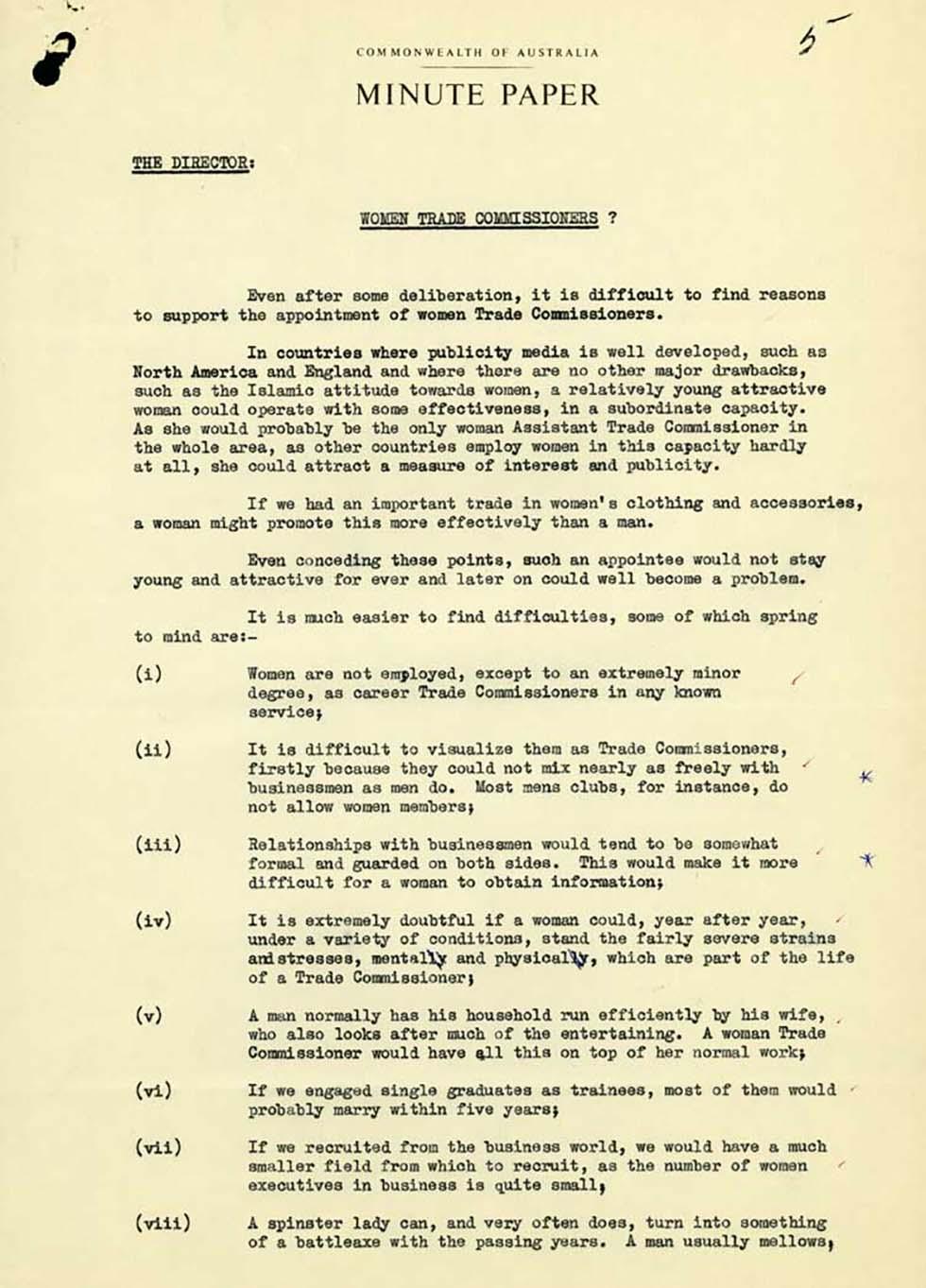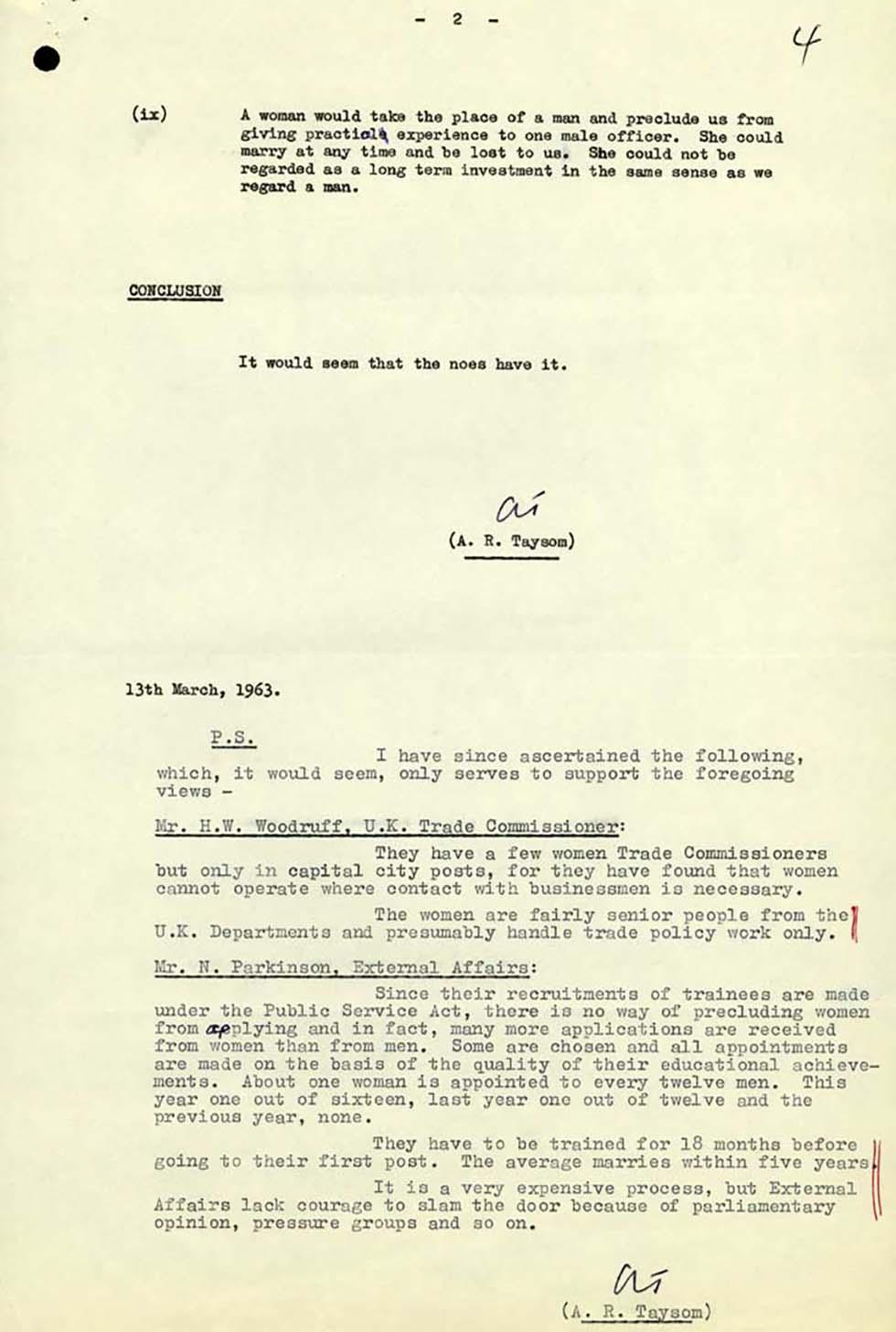

Aboriginal and Torres Strait Islander people should be aware that the National Archives' website and collection contain the names, images and voices of people who have died.
Some records include terms and views that are not appropriate today. They reflect the period in which they were created and are not the views of the National Archives.



[Page 1.]
[Handwritten number '5' in top right corner.]
[Letterhead: 'COMMONWEALTH OF AUSTRALIA', 'MINUTE PAPER'.]
[Underlined:] THE DIRECTOR:
[Underlined heading:] WOMEN TRADE COMMISSIONERS?
Even after some deliberation, it is difficult to find reasons to support the appointment of women Trade Commissioners.
In countries where publicity media is well developed, such as North America and England and where there are no other major drawbacks, such as the Islamic attitude towards women, a relatively young attractive woman could operate with some effectiveness, in a subordinate capacity. As she would probably be the only woman Assistant Trade Commissioner in the whole area, as other countries employ women in this capacity hardly at all, she could attract a measure of interest and publicity.
If we had an important trade in women’s clothing and accessories, a woman might promote this more effectively than a man.
Even conceding these points, such an appointee would not stay young and attractive for ever and later on could well become a problem.
It is easier to find difficulties, some of which spring to mind are: -
(i) Women are not employed, except to an extremely minor degree, as career Trade Commissioners in any known service; [handwritten tick in black ink.]
(ii) It is difficult to visualise them as Trade Commissioners, firstly because they could not mix nearly as freely with businessmen as men do. Most mens [sic] clubs, for instance, do not allow women members; [handwritten tick in black ink; handwritten star in blue ink.]
(iii) Relationships with businessmen would tend to be somewhat formal and guarded on both sides. This would make it more difficult for a woman to obtain information; [handwritten tick in black ink; handwritten star in blue ink.]
(iv) It is extremely doubtful if a woman could, year after year, under a variety of conditions, stand the fairly severe strains and stresses, mentally ['ly' crossed out] and physically ['ly' crossed out], which are part of the life of a Trade Commissioner; [handwritten tick in black ink.]
(v) A man normally has his household run efficiently by his wife, who also looks after most of the entertaining. A woman Trade Commissioner would have all this on top of her normal work; [handwritten tick in black ink.]
(vi) If we engaged single graduates as trainees, most of them would probably marry within five years; [handwritten tick in black ink.]
(vii) If we recruited from the business world, we would have a much smaller field from which to recruit, as the number of women executives in business is quite small; [handwritten tick in black ink.]
(viii) A spinster lady can, and very often does, turn into something of a battleaxe with the passing years. A man usually mellows;
[Page] -2-
[Handwritten number '4' in top right corner.]
2 -
Page 2
(ix) A woman would take the place of a man and preclude us from giving practicle [spelling corrected in blue ink to 'practical'] experience to a male officer. She could marry at any time and be lost to us. She could not be regarded as a long term investment in the same sense as we regard a man.
[Underlined subheading:] CONCLUSION
It would seem that the noes have it.
[Handwritten initials:] AT
(A.R. Tayson) [underlined.]
13th March, 1963
[Underlined subheading:] P.S.
I have since ascertained the following, which, it would seem, only serves to support the foregoing views –
[Underlined subheading:] Mr. H.W. Woodruff, U.K. Trade Commissioner:
They have a few women Trade Commissioners but only in capital city posts, for they have found that women cannot operate where contact with businessmen is necessary.
The women are fairly senior people from the U.K. Departments and presumably handle trade policy work only. [Sentence emphasised by red line in margin.]
[Underlined subheading:] Mr. N. Parkinson, External Affairs:
Since their recruitments of trainees are made under the Public Service Act, there is no way of precluding women from replying [corrected in black ink to ‘applying’,] and in fact, many more applications are received from women than from men. Some are chosen and all appointments are made on the basis of the quality of their educational achievements. About one woman is appointed to every twelve men. This year one out of sixteen, last year one out of twelve and the previous year, none.
They have to be trained for 18 months before going to their first post. The average marries within five years. [Sentence emphasised by two red lines in margin.]
It is a very expensive process, but External Affairs lack courage to slam the door because of parliamentary opinion, pressure groups and so on. [Sentence emphasised by two red lines in margin.]
[Handwritten initials:] AT
(A.R. Tayson) [underlined.]
This is an internal minute from AR Taysom, an officer of the Trade Commissioner Service, to his director and is numbered 4 and 5 on a Department of Trade file called 'Appointment of Female Trade Commissioners (Policy)'. The minute outlines nine reasons why the writer believes women should not be appointed as trade commissioners.
Learning resource text © Education Services Australia Limited and the National Archives of Australia 2010.
Learn how to interpret primary sources, use our collection and more.
